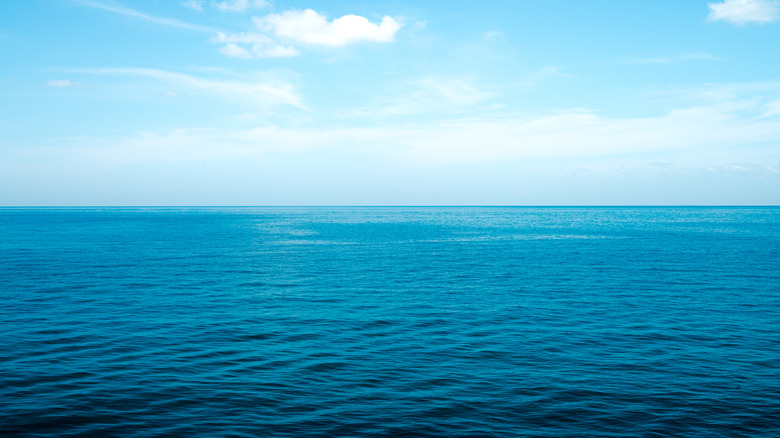What Is Thalassophobia?
There's a reason why many people choose beach vacations when they're planning a getaway. Oceans and "blue spaces" can help improve your mental health, according to research. One 2016 study published in Environment and Behavior showed that people who watched marine life in a tank of water experienced slower heart rates and better moods. A 2021 study published in Scientific Reports also found a relationship between frequent visits to blue spaces and positive well-being scores.
Spending time near the water is considered by many to be calming and even inspirational. But for other people, the ocean and other large bodies of water don't induce a state of relaxation — they trigger anxiety. Though the majority of the Earth's surface, around 71%, is covered in water (per USGS), these waterways can seem intimidating for several reasons, from the possibility of drowning to the thought of coming in contact with a shark or other dangerous water creatures (via Medical News Today).
In some cases, a fear of large bodies of water can even spiral into an intense phobia.
Here's what it means to have thalassophobia
Thalassophobia is the extreme fear of the ocean or other bodies of water, according to Medical News Today. While water can be dangerous in certain scenarios, like during a storm (per Centers for Disease Control and Prevention), people with thalassophobia experience fear even when water conditions are safe (via Medical News Today). As a result, they may avoid entering the water, traveling on boats, or being near beaches and shores.
Similar to other anxiety disorders, symptoms of the phobia can include trouble concentrating, increased heart rate, shortness of breath, upset stomach, or a feeling of dread or impending doom (per Healthline). In severe cases, the fear may also lead to a panic attack.
Thalassophobia, along with other types of phobias, are irrational, but that doesn't mean they appear without reason. PsychCentral explains several possible explanations for thalassophobia including genetics, a dysfunction in brain wiring, or picking up the fear during childhood from a family member who modeled it. Other people may only develop the phobia later in life after a traumatic experience involving a large body of water.
People with thalassophobia don't have to stay away from oceans, lakes, and rivers for good. Luckily, therapy, anxiety medications, and relaxation techniques can help those affected by the phobia overcome their fears.


